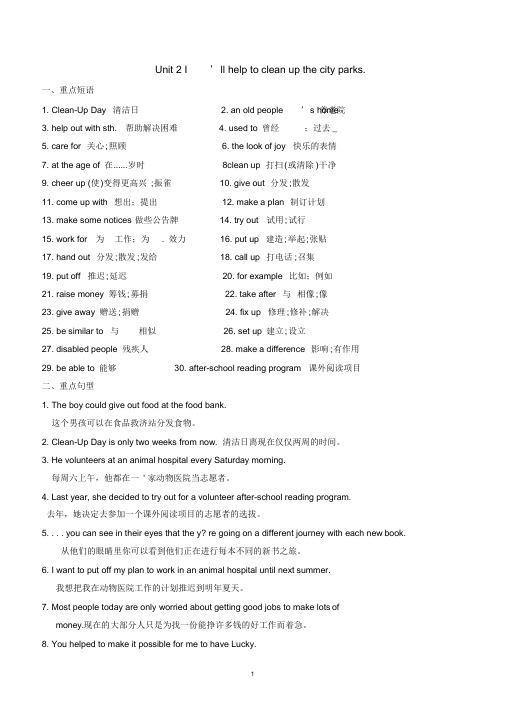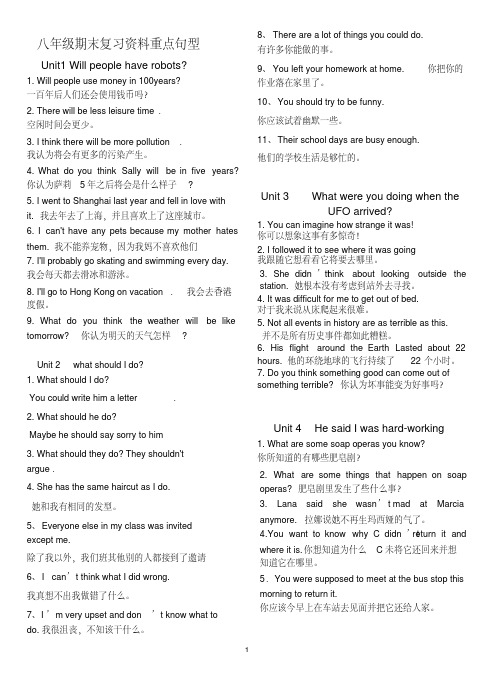人教版新目标八年级英语下册全册重点及练习(最新)
(完整word版)人教版新目标八年级下册_英语语法知识点精讲+练习,推荐文档

新目标八年级下册英语语法知识点精讲+练习(一)一般将来时一般将来时表示将来某个时间要发生的动作或者存在的状态。
通常与表示将来的时间状语连用,如tomorrow, the day after tomorrow, next year, next month, next week, in 100 years等。
be going to do(动词原形)结构:表示打算、准备做的事情或者肯定要发生的事情。
如:It is going to rain.will do结构表示将来的用法:1. 表示预见Do you think it will rain?You will feel better after a good rest.2. 表示意图I will borrow a book from our school library tomorrow.What will she do tomorrow?基本构成如下:一般疑问句构成:(1)will+主语+do…? Will Sarah come to visit me next Sunday?(2)there be 结构的一般疑问句:Will there + be …?Will there be fewer trees? Yes, there will. / No, there won’t否定句构成:will + not (won’t)+doSarah won’t come to visit me next Sunday.特殊疑问句构成:特殊疑问词+will+主语+…?What will Sarah do next Sunday?★★练一练★★根据例句,用will改写下列各句例:I don’t feel well today. (be better tomorrow)I’ll be better tomorrow.1. Gina has six classes today. (have a lot of homework tonight)_____________________________2. I’m tired now. (sleep later)_____________________________3. My parents need a new car. (buy one soon)_____________________________4. We can’t leave right now. (leave a little later)_____________________________5. The weather is awful today. (be better tomorrow)_____________________________答案:1. She’ll have a lot of homework tonight.2. I’ll sleep later.3. They’ll buy one soon.4. We’ll leave a little later.5. Maybe it’ll be better tomorrow.(二)should的用法:should用来提出建议和忠告,后边加动词原形,否定句直接在should后边加not.例如:I think you should eat less junk food.我认为你应该少吃垃圾食品。
新目标人教版英语八年级下册unit3知识点+练习题

新目标人教版英语八年级下册u n i t3知识点+练习题-CAL-FENGHAI.-(YICAI)-Company One1Unit3 Could you please clean your room?Section A(1a-2d)学习目标:1.掌握1a-2d的词语2.学习提出礼貌的请求和请求允许;3.学会使用句型:Could you please...和Could I...;4.学习重点:掌握一些家务活动相关的动词短语。
掌握情态动词could的用法和助动词do的用法。
5.学习难点:掌握情态动词could的用法和助动词do的用法【一】自主学习明确目标1 试读单词,解决语音问题,联系有关旧单词2 查阅下面的短语动词1) 出去吃饭_______________ 2)在外面待到很晚_______________3)去看电影_______________ 4)搭车_______________5)完成做某事_______________ 6)干净整洁_______________ 7)洗餐具_______________ 8)倒垃圾_______________9)叠衣服_______________ 10)扫地_______________ 3.观察以上词组的构成方式:【语言点】1. —Peter, could you please take out the trash请你把垃极倒掉好吗—Sure, Mom.可以,妈妈。
—Could you please do the dishes 请洗盘子好吗—Sorry, I can’t. I have to do my homework.抱歉,我不能。
我得做作业。
(1)在表示请求帮助或请求允许的疑问句中,常用could代替can,以表示礼貌,委婉或不确定的语气,而can则不具备这些语气。
这种情况下不能把could看作can的过去式。
以上两句中用could是为了表示礼貌的请求。
人教新目标八年级英语下册Unit2-I’ll-help-to-clean-up-the-city-parks-全单元知识点和练习

Unit 2 I ’ll help to clean up the city parks.一、重点短语1. Clean-Up Day 清洁日2. an old people ’s h养om老e院3. help out with sth. 帮助解决困难4. used to 曾经;过去_5. care for 关心; 照顾6. the look of joy 快乐的表情7. at the age of 在......岁时8clean up 打扫(或清除)干净9. cheer up (使)变得更高兴;振雀10. give out 分发;散发11. come up with 想出;提出12. make a plan 制订计划13. make some notices 做些公告牌14. try out 试用; 试行15. work for 为工作;为. 效力16. put up 建造; 举起; 张贴17. hand out 分发;散发;发给18. call up 打电话;召集19. put off 推迟; 延迟20. for example 比如;例如21. raise money 筹钱; 募捐22. take after 与相像;像23. give away 赠送; 捐赠24. fix up 修理;修补;解决25. be similar to 与相似26. set up 建立; 设立27. disabled people 残疾人28. make a difference 影响;有作用29. be able to 能够30. after-school reading program 课外阅读项目二、重点句型1. The boy could give out food at the food bank.这个男孩可以在食品救济站分发食物。
2. Clean-Up Day is only two weeks from now.清洁日离现在仅仅两周的时间。
(完整版)人教版新目标英语八年级下册知识点全归纳

八年级期末复习资料重点句型Unit1 Will people have robots?1. Will people use money in 100years?一百年后人们还会使用钱币吗?2. There will be less leisure time.空闲时间会更少。
3. I think there will be more pollution.我认为将会有更多的污染产生。
4. What do you think Sally will be in five years? 你认为萨莉5年之后将会是什么样子?5. I went to Shanghai last year and fell in love with it. 我去年去了上海,并且喜欢上了这座城市。
6. I can't have any pets because my mother hates them. 我不能养宠物,因为我妈不喜欢他们7. I'll probably go skating and swimming every day. 我会每天都去滑冰和游泳。
8. I'll go to Hong Kong on vacation.我会去香港度假。
9. What do you think the weather will be like tomorrow? 你认为明天的天气怎样?Unit 2what should I do?1. What should I do?You could write him a letter.2. What should he do?Maybe he should say sorry to him3. What should they do? They shouldn'targue.4. She has the same haircut as I do.她和我有相同的发型。
人教新目标版2020中考英语八年级下册教材知识点梳理与练习含答案

time
4.冒险 take
27.担忧;担心 worry
短
about doing sth.
risks/take a risk
about=be worried
语
17.放弃做某事 give up
5.量体温 take one's
about
temperature
doing sth. 28.(外貌或行为)像
18.(使)变得更高兴;振奋
足;满意→satisfy(v.)
→stomach(n.) 胃
8.important(adj.)重要的 满意→satisfied(adj.)
词
2.foot(n.)脚;足
→importance(n.)重要性; 满意的
性
→feet(复数)
重要
13.broken(adj.)破损的;
转
3.lie(v.)躺;平躺
旅客
38.notice(n.)通知;通告; 设想★
16.trouble(n.)问题; 注意(v.)注意到;意识到 58.difficulty(n.)困难;
苦恼★
39.lonely(adj.)孤独的; 难题
17.hit(v.)(用手或器 寂寞的★
59.open(v.)开;打开
具)击;打
40.several(pron.)几个; 60.door(n.)门
的公交车司机王平没有多考虑就把车停 atisfaction__ when I see the
了下来。
animals get better and the look
6.__Thanks__to__ Mr.Wang and the of joy on their __owners'__
人教版新目标英语八年级下册同步练习及答案(含八上复习和结课测试)

八年级上复习八年级上Unit1—Unit3一.重点短语:1.on weekends2.on weekdays3.as for4.my eating habits5.have a healthy lifestyle6.the same as7.the result of8.junk food9.get good grades 10.see a dentist 11.have a healthy habit 12.be stressed out 3.a balanced diet 14.for example 15.at the moment 16.be sorry to do sth 17.go bike riding 18.take walks=go for walk 19.take a vacation 20.plan to do sth 21.western country 22.take sth with sb 23.depend on 24.host family 25.hardly ever 6.ask sb about sth 27.get back to school 8.a balance of 29.kind of二.考点归纳:考点1.want sb to do sth 想要某人干某事His father wants him_____(become )an actor.考点2.try 的用法:1).try(not) to do sth 尽力(不)干某事He tries ______(eat) lots of vegetables and fruit every day .2).try one’s best to do sth 尽某人最大努力干某事We should try our best ______ (study) all subjects.3)词组: try on 试穿have a try 试一试考点3.although 的用法:although /though 引导让步状语从句,“即使,虽然”,不能与but 连用,但可与yet, still 连用。
人教新目标版2020中考英语八年级下册教材知识点梳理与练习含答案

人教新目标版2020中考英语八年级下册教材知识点梳理与练习八年级英语(下) Units 1—2单元重点回顾类别课标考点要求重点单词1.matter(n.)问题;事情2.stomachache(n.)胃痛;腹痛3.foot(n.)脚;足★4.neck(n.)颈;脖子5.stomach(n.)胃;腹部6.throat(n.)咽喉;喉咙7.fever(n.)发烧8.lie(v.)躺;平躺★9.rest(v.& n.)放松;休息10.cough(n.& v.)咳嗽11.toothache(n.)牙痛12.headache(n.)头痛13.break(n.)间歇;休息14.hurt(v.)(使)疼痛;受伤★15.passenger(n.)乘客;旅客16.trouble(n.)问题;苦恼★23.risk(n.& v.)危险;风险;冒险24.situation(n.)情况;状况25.rock(n.)岩石26.knife(n.)刀★27.blood(n.)血28.mean(v.)意思是;打算;意欲29.importance(n.)重要性;重要★30.decision(n.)决定;抉择★31.control(n.& v.)限制;约束;管理32.spirit(n.)勇气;意志33.death(n.)死;死亡★34.nurse(n.)护士35.cheer(v.)欢呼;喝彩36.volunteer(v.)义务做;自愿做(n.)志愿者37.sign(n.)标志;信号38.notice(n.)通知;通告;注意(v.)注意到;意识到45.owner(n.)物主;主人46.journey(n.)(尤指长途)旅行;行程47.raise(v.)募集;征集★48.alone(adv.)独自;单独★49.repair(v.)修理;修补50.fix(v.)修理;安装51.broken(adj.)破损的;残缺的★52.wheel(n.)车轮;轮子53.letter(n.)信;函54.disabled(adj.)丧失能力的;有残疾的55.blind(adj.)瞎的;失明的56.deaf(adj.)聋的57.imagine(v.)想象;设想★58.difficulty(n.)困难;难题59.open(v.)开;打开17.hit(v.)(用手或器具)击;打18.herself(pron.)(sh e的反身代词)她自己★19.sick(adj.)生病的;有病的20.knee(n.)膝;膝盖21.ourselves(pron.)( we的反身代词)我们自己22.climber(n.)登山者;攀登者39.lonely(adj.)孤独的;寂寞的★40.several(pron.)几个;数个;一些★41.strong(adj.)强烈的;强壮的42.feeling(n.)感觉;感触★43.satisfaction(n.)满足;满意44.joy(n.)高兴;愉快60.door(n.)门61.carry(v.)拿;提;扛62.train(v.)训练;培训63.excited(adj.)激动的;兴奋的★64.kindness(n.)仁慈;善良★65.clever(adj.)聪明的;聪颖的66.understand(v.)理解;领会67.change(v.& n.)变化;改变68.interest(n.)兴趣;关注(v.)使感兴趣;使关注★词性转换1.stomachache(n.)胃痛;腹痛→stomach(n.)胃2.foot(n.)脚;足→feet(复数)3.lie(v.)躺;平躺→lying(现在分词)→lay(过去式)→lain(过去分词)4.hurt(v.)(使)疼痛;受伤→hurt(过去式/过去分词)5.herself(pron.)她自7.knife(n.)刀→knives(复数 )8.important(adj.)重要的→importance(n.)重要性;重要9.decision(n.)决定→decide(v.)决定10.death (n.)死亡→die(v.)死→dead(adj.)死的;死亡的→dying(adj.)要死的11.feeling(n.)感觉;感触→feel(v.)感觉;感到12.satisfaction(n.)满足;满意→satisfy(v.)满意→satisfied(adj.)满意的13.broken(adj.)破损的;残缺的→break(v.)坏;打破→broke(过去式)→broken(过去分词)14.difficulty(n.)困难;难题→difficult(adj.)困难的15.interest(v.& n.)使己→themselves她们自己6.hit(v.)击;打→hitting(现在分词)→hit(过去式/过去分词) →felt(过去式/过去分词) 感兴趣;使关注→interested(adj.)感兴趣的→interesting(adj.)有趣的重点短语1.发烧/咳嗽/感冒/流鼻血have afever/cough/cold/nosebleed2.患流感have the flu3.头痛/牙痛/胃疼haveaheadache/toothache/stomachache4.冒险take risks/takea risk5.量体温take one'stemperature6.下车get off7.上车 get on8.使……惊讶的是;出乎……的意料to one'ssurprise9.遇上麻烦;处于困境get into trouble10.掌管;管理be incontrol of11.用尽;耗尽run out12.及时in time13.幸亏;由于thanks to14.作出决定(做某事)makea decision (to do sth.)=decide (to do sth.)15.对做……感兴趣beinterested in doing sth.16.考虑做某事thinkabout doing sth.17.放弃做某事give updoing sth.18.(使)变得更高兴;振奋起来cheer up19.分发;散发give out20.想出;提出(主意、计划、回答等)come up with21.推迟put off22.张贴;搭建;举起putup23.分发hand out24.曾经……;过去……used to25.在……岁的时候atthe age of…26.同时at the sametime27.担忧;担心worryabout=be worriedabout28.(外貌或行为)像take after29.赠送;捐赠give away30.与……相似besimilar to…31.建起;设立set up32.影响;有作用make adifference33.对……感到兴奋beexcited about sth.34.立刻;马上at once(of) 35.没能力做某事beunable to do sth. 续表类别课标考点要求重点句子1.—What's the matter?你怎么了?—I have a __sore__back__.我背痛。
人教版新目标英语八年级下册知识点全归纳

八年级(下)英语知识讲解(人教)目录1 Unit 1 Will people have robots?2 Unit 2 What should I do?3 Unit3 What were you doing when the UFO arrived?4 Unit 4 He said I was hard-working.5 Unit 5 If you go to the party, you’ll have a great time!6 Review of units 1-37 Review of units 4-58 八年级下学期期中复习(一)9 改错小练10 八年级下学期期中复习(二)11 八年级期中考试模拟题12 Unit 6 How long have you been collecting shells?13 Unit 7Would you mind turning down the music?14 Unit 8 Why don’t you get her a scarf?15 Unit 9 Have you ever been to an amusement park?16 Unit 10 It’s a nice day, isn’t it?17 介词复习18 Review of units 6-819 Review of units 9-1020 八年级第二学期期末复习题21 八年级第二学期期末模拟试题22 How do you study for a test23 Unit2 I used to be afraid of the darkUnit 1Will people have robots?II. Grammar:·一般将来时·there will be ·few,a few,little,a little,much,many语法小结:一、一般将来时1.用be doing表示将来:主要意义是表示按计划、安排即将发生的动作,常用于位置转移的动词。
- 1、下载文档前请自行甄别文档内容的完整性,平台不提供额外的编辑、内容补充、找答案等附加服务。
- 2、"仅部分预览"的文档,不可在线预览部分如存在完整性等问题,可反馈申请退款(可完整预览的文档不适用该条件!)。
- 3、如文档侵犯您的权益,请联系客服反馈,我们会尽快为您处理(人工客服工作时间:9:00-18:30)。
1
第 1 页共42 页
Unit 1 What ’s the matter?
重点短语:
have a stomachache
have a cold
lie down
take one ’s temperature have a fever
go to a doctor to one ’s surprise agree to (do sth.) get into trouble be used to take risks run out (of) cut off
get out of be in control of
keep on ( doing sth.)
give up
语言知识归纳:
1. What ’s the matter (with you)?
此句用来询问别人的病情。
类似的句子还有:What ’s wrong with you?/ What ’s the trouble?
matter 作动词用,意为“要紧”“有关系”,主要用于疑问句和否定句。
What does it matter? It doesn ’t matter. 【例题】Does it ________ if we can ’t finish it today?
A. mind
B. minds
C. matter
D. matters
2. I have a sore throat. have “患病”,常用“have a /an+ 名词”. have a cold have a fever have a sore back have a stomachache have a cough 【例题】( )---Does he often have ______ cold? ---Yes. He also _____a cough and a sore throat.
A. a; has
B. /; has
C. a; have
D. /; have 3.Lie down and rest! 躺下休息lie down 躺下
4.That ’s probably why. 那可能就是原因。
probably 意为“很可能,大概”,表示的可能性很大,是一种近乎肯定的意思。
5.hurt v.使受伤;伤害;疼痛
He hurt his leg when he fell. 他摔伤的时候伤了腿。
My feelings were hurt when he didn ’t ask me to the party.他没有请我参加聚会使我很伤心。
6.The bus driver, 24-year-old Wang Ping...公交车司机,24岁的王平……
24-year-old 是用连字符连接数字和名词所构成的一个形容词结构,意思是“24岁的”。
(名词必须用单数,常用在名词前做定语)
【例题】A____girl named DongXinyi looked after her disabled father.
A. three-year-old
B. three-years-old
C. Three years old
单词词义过去式过去分词现在分词lie 说谎lied lied lying lie
躺,平放
lay
lain
lying。
